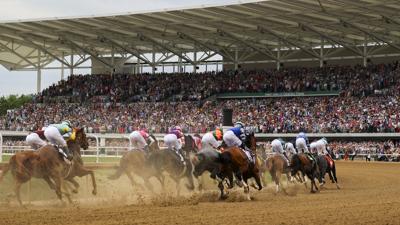Note: Coffee with Crawford is a new daily weekday conversation — one story, one thought, or one question to start your day. Sometimes it will be about sports. Sometimes it will be about life. Often, it will be both. Always, it's meant to be quick, thoughtful and worth your time — something to go with your first cup of coffee (or whatever gets you going). Thanks for joining me.
Lately, I've been thinking about losers.
It's the start of Kentucky Derby week. Everybody's asking, "Who do you like?" It's all about picking a winner.
But I spent part of Sunday thinking about the other end — picking losers. Specifically, I was researching a story on last-place Derby finishers.
It's a fact of every race: Someone has to finish last. Why not show them a little love?
The names at the bottom of Derby charts represent a roll call of heartbreak — and sometimes, tragedy. Some of those horses were injured, and often their immediate fate wasn't even reported.
Kentucky Derby 151 | Derby Prep Races | Derby Festival Events
One of the most famous recent losers? Thunder Snow. He didn't just lose the 2017 Derby — he didn't even finish. After breaking from the gate, he bucked like a rodeo horse and was pulled up almost immediately, going viral in the process.
Another memorable last-place finisher was Mendelssohn, a European star who simply didn't take to the wettest Derby track in history. He lost to winner Justify by nearly 70 lengths.
Alard Scheck was the first odds-on favorite to finish last, running fifth in a five-horse field at 2-7 odds in 1901. His jockey said he "sulked" when asked to go at the top of the stretch. It happened again a year later when Abe Frank ran last as the odds-on favorite. It hasn't happened since.
The chart comments for last-place horses can be fun — and a little painful to read. In 1887, Pendennis was the first Derby colt I could find to get a one-word descriptor: "Quit." He wasn't the last.
More often, it's a chorus of futility: tired badly, showed nothing, raced wide, was overmatched, could not keep pace.
And then there was Jett Jett in 1947, who not only, according to the chart comments, unseated his rider at the post, but then "ran off a quarter and showed nothing in the running."
That seemed a bit excessive.
But there are stories of triumph at the bottom of the chart, too.
- Hall of Fame jockey Pat Day pulled up Demons Begone when the colt was bleeding badly from his nostrils. The horse survived and lived a good, long life to age 17.
- There's Flip Sal, who finished 23rd in a 23-horse field in 1974. He fractured his leg during the race — and received a flood of cards and letters from fans.
The great sports columnist Jim Murray described Flip Sal's injury with his typical dark poetry:
"He snapped a whole bunch of bones in his leg and went flopping around the track like a bird with one wing gone."
Flip Sal was given just a 20% chance of survival.
He beat the odds — and even went on to sire successful offspring.
And then there's my favorite last-place story: Holy Land.
In the 1970 Derby, he clipped heels and fell on the second turn. Two years later, in a race at Belmont Park, he came back and beat not only one horse that finished ahead of him in the Derby — but also 1971 Derby winner Cannonero II.
Finishing last in the greatest horse race in the world isn't a badge of dishonor.
In fact, if you look closely at the list of last-place finishers, you'll find some of the greatest trainers and jockeys in Derby history. John Velazquez finished dead last in each of his first three Kentucky Derbies, 1996, '98 and '99. He's now a Hall of Famer, and one of just 11 riders to win the Derby three times.
It's a good reminder: sometimes the real story isn't in the winner's circle.
Quick Sips
Interested in this idea of “failing forward”?
Check out David Duchovny's podcast Fail Better. He has some great conversations with people whose failures propelled their lives in surprising ways.
Favorite episode: His conversation with Sally Jenkins about her book Good Sports is well worth a listen. And the book is my most-recommended sports book of the past couple of years, while you're at it.
It's Monday, which means a new episode of Overtime drops this afternoon!
Catch my 30-minute webcast with Rick Bozich on WDRB+ — and if you haven't already, think about downloading the app.
The Last Drop
"No horse can go as fast as the money you bet on him."
— Nate Collier
Copyright 2025 WDRB Media. All Rights Reserved.

